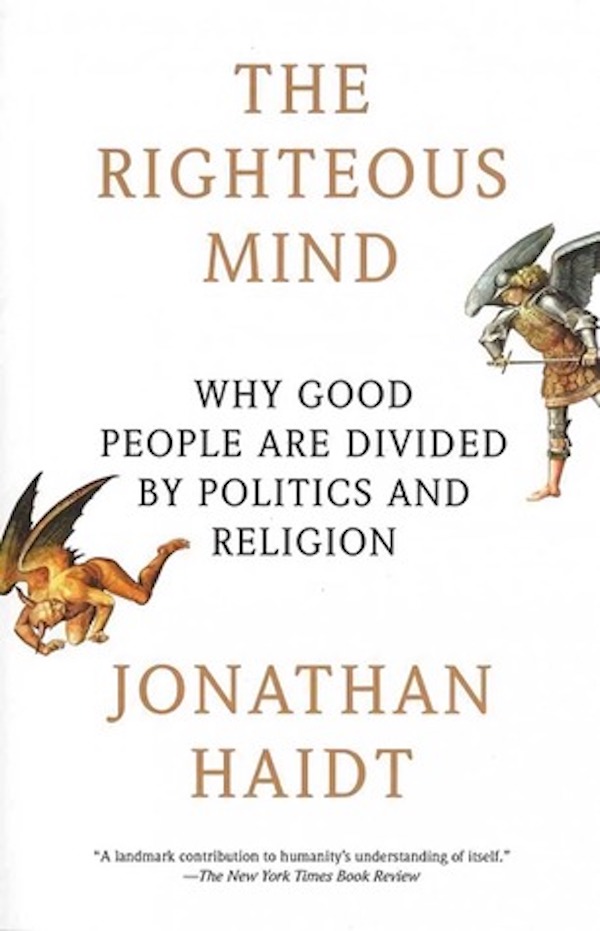If I Want to Love Others Better, I Need to Tear Down the Idols of My Own Opinions
I am reading Jonathan Haidt’s book “Righteous Mind: Why Good People Are Divided by Politics and Religion.” At first, I could not get enough of this profoundly enlightening look at what makes human beings moral creatures and just how we have developed our moral thinking over time. His grasp of not only his profession—social psychology—but also his ability to masterfully articulate it like a Pulitzer-Prize-winning novelist exceeded my expectations.
But something happened along the way, and I slowed down in my reading of it, still having 100 pages to go.
In Christian parlance, I became convicted to the core when I realized I am not led by reason (my brain), which I had thought, which is one of the main theses in the book. Rather, I am led by intuition (my feelings), and my reason defends my intuition like a gifted defense attorney who does not need to know whether their client is innocent or guilty to do their job well. So, this pride I have in thinking my decisions, my thoughts, and my opinions are actually led by my ability to reason is unwarranted because Haidt shows in study after fascinating study that I am, in fact, led by my feelings.
Confirmation Bias
He writes, “Our moral thinking is much more like a politician searching for votes than a scientist searching for truth” (pg. 89). This leads us to something we, as Americans, in our glut of information suffer from over and over again: confirmation bias. We love to play the devil’s advocate against those beliefs we do not agree with; and we get almost addicted to people and sources that confirm what we already think. He describes our belief as our “possession—[our] child, almost—and [we] want to protect it, not challenge it and risk losing it” (pg. 93).
Just before 2020 came to its conclusion and around the time I began reading “Righteous Mind,” I listened to a Theology in the Raw podcast by author and teacher Preston Sprinkle, my go-to person for teaching on Christian faith in relation to sexuality and gender. He is someone I greatly admire for how he treats those with whom he disagrees with Christ-like humility, compassion, and love.
Sprinkle was talking with Gregory Boyd, another Christian thinker I admire, in a podcast titled, “Voting, Politics, Kingdom of God, Inerrancy of Scripture.” In it, Boyd shared with Sprinkle that what’s hot on the market right now is the idol of the rightness of our political opinion. I would even go further to say, the so-called rightness of all our opinions, not just political ones.
A Different Lens
At about the 25-minute mark, Boyd says, “Jesus did not say to go have the right opinions about how the government should address the weak, the homeless, the poor, the outsider. What he said was go out and feed the hungry, welcome in the stranger, show hospitality, radical hospitality … our job is to do it, not to have all the right opinions about what government should do about it and then dividing over it! Oh what a travesty! We (Christians) divide over something that we weren’t called to do and [Satan] keeps us from doing the one thing we are called to do!”
It was then I began to see my opinions through a different, less complimentary lens. I realized they are in fact idols I worship at the cost of my relationships with others, in addition to the cost of my relationship with God. These opinions stand in the way of God’s greatest commandments—to love God with all my heart, soul, and mind, and to love others as myself.
Ouch.
Thankfully, “Righteous Mind,” as convicting as it was, also gives me hope.
Interacting With Others
Ironically, it is in practicing this biblical command to love others that my intuitions will begin to be shaped by my reasoning, not the other way around as is most common, according to Haidt. He writes, “The main way that we change our minds on moral issues is by interacting with other people” (pg. 79). In other words, proximity breeds compassion, as one of my friends likes to say.
Haidt continues, “If there is affection, admiration, or a desire to please the other person, then the elephant (how he pictures intuition) leans toward that person and the rider (how he pictures reason) tries to find the truth in the other person’s arguments” (pg. 80).
That is to say, if I want to love others better, I need to tear down the idols of my own opinion. I am not all-knowing nor will I ever be this side of Heaven, according to my faith tradition. So, it seems incredibly wise of the God of the Bible that one of his greatest commandments is to love others. Because he knew, as Haidt eloquently shows in his book, it is only by following this command in community, in relationship, in conversation, together, that we can begin to understand better ways forward.









